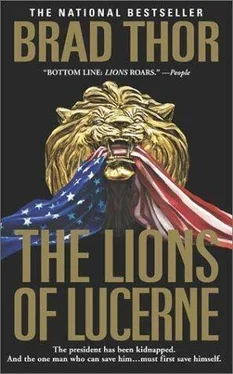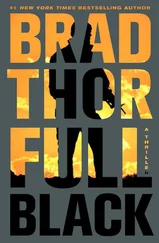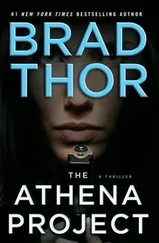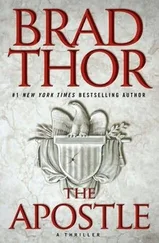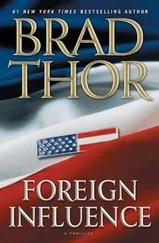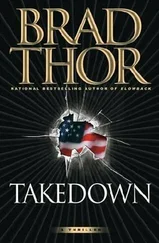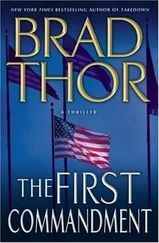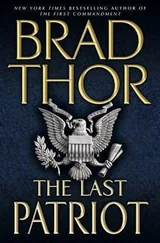His problem now was the shooter in the van. From where the van was parked, the shooter had a pretty good command of this length of the street. The sirens were getting closer. Both Harvath and the man in the van would have to make their moves soon.
Fours shots from the van in quick succession tore up the roof and shattered the glass of the car Scot was using for cover.
Harvath waited, but the van showed no sign of moving. They were playing a very deadly game of chicken. Show yourself and be shot; wait too long and be picked up by the police. Harvath knew the man in the van wouldn’t want that and probably knew that he felt exactly the same way. He needed to make a move, and he needed to make it now.
Thinking back, Scot realized the shooter in the van hadn’t begun firing at him until he had run back toward his bank, which meant that if he went in the other direction, the guy probably wouldn’t have a clean shot. It was the only choice Scot had.
Harvath hadn’t taken his eyes off the reflection in the glass for a second. The man still sat in the van, its doors open, with his rifle pointed in Scot’s direction. He hadn’t figured out that Scot could see him in the glass, or else he surely would have blown it out. Or would he? Maybe the shooter was using the glass to his advantage as well.
Fixing the position of the van in his mind, Scot turned his Glock toward the storefront and chose several spots that would allow his bullets to break the glass, but minimize the chances of hitting anyone inside. He fired and, as the glass came tumbling down, he turned his weapon toward where he remembered the van to be and began firing as he ran back up the sidewalk, away from the bank.
He managed to pin down the shooter in the van long enough to escape his line of fire. He was now safely out of range, but didn’t know what would face him in just a few car lengths.
The furniture truck was still in the middle of the street. Scot kept his pistol at the ready. Sliding out into the street, he glanced back to make sure no one from the van was coming up behind him. So far, it was clear.
Harvath hugged the back of the furniture truck and moved up the passenger side. As he neared the cab, he could see the crumpled gray metal of the Maxima. It was totaled. Crouching by the truck’s right front tire, Harvath held the Glock in both hands ready to swing out and search for the shooters. He took a deep breath, applied pressure to the trigger and spun, just as he heard a noise from behind.
The truck’s passenger door began to swing open. An older, gray-haired black man, whose eyes were wild with fright, was attempting to climb down.
“Stay where you are,” ordered Harvath. “Get back in your truck, close the door, and stay on the floor.” The man did as he was told.
Scot waited a beat and then sprang forward. He swept the Glock from side to side, ready to take down any of the assailants in or around the vehicle who might still be armed. There were none. The Nissan’s trunk was completely crunched against its backseat. The car’s interior was filled with broken glass and brass shell casings, as was the ground around it. The men had fled. The police were almost on top of the scene, and Harvath also decided fleeing was a good idea. There was nothing to gain by hanging around.
While sifting through the contents of his safe deposit box and André Martin’s envelope again, it had become obvious to Scot that his only chance to get to the bottom of things was to go to Interlaken himself. After the attack outside the bank, he knew it was the right move. Besides, he reasoned, who wouldn’t want a break from the goddamn D.C. weather? Rain, sleet, snow, and now bullets. He just prayed he wouldn’t be embarking upon on a wild-goose chase.
Three blocks away, he caught a cab that took him straight down M Street to the tony Georgetown Park mall. This time, he had cash for the driver.
For some reason, the mall’s Edwardian interior, in green with brass touches, always reminded him of Harrods in London. The waterfalls, which he normally found soothing, didn’t work their magic on him today. He made his way toward the J. Crew store and paid for his purchases with bills from the twenty thousand dollars in cash he had removed from his safe deposit box. He’d always kept an emergency reserve, just in case, and today he was glad he had. He didn’t dare use his credit card again. He had used it for two cab rides and was sure that was how the assassins had tracked him. With plenty of cash at his disposal, he could afford to ditch the plastic.
Leaving J. Crew, he bent his credit cards back and forth until he could break them into pieces. He pocketed the pieces and made his way toward Voyageur Luggage. At Voyageur, he picked up a wheeled KIVA Designs travel bag that could be converted into a backpack. It was big enough to hold the clothing he bought, but small enough to fit into an overhead compartment. Next on his list was Crabtree amp; Evelyn, where an attractive woman named Leslie outfitted him with a complete men’s toiletry kit and a women’s Pamper Yourself gift basket. Harvath counted out the bills, thanked the clerk, and asked where the nearest men’s room was.
Outside the washrooms was a bank of pay telephones. Harvath chose the one at the far end and, opening the yellow pages, looked up the eight hundred number for Swissair. Knowing the quickest way to get an operator was to select the business-and-first-class-reservation option, he pressed the appropriate button. After only a few seconds a polite agent came on the line. According to the woman, Swissair had a 5:40 P.M. flight leaving Dulles that would arrive in Zurich at 7:35 the next morning. Harvath made a reservation in the name of Hans Brauner, memorized the record-locator number, thanked the agent, and hung up the phone. Harvath had been keeping an eye on the men’s room. There was very little traffic, so he decided now was as good a time as any.
Inside, he looked under each stall to make sure they were vacant and chose one toward the very end. He locked the door and placed his bags in front of him. The pain in his head made it feel as if it were cracking wide open, and his stomach churned violently with nausea. Dr. Helsabeck had been right about stress and exertion making his symptoms worse, but there was no time to coddle himself. Scot faced the toilet and forced himself to vomit. If that’s what his body wanted to do, then let’s get it over with, he reasoned.
He used some toilet paper to wipe his mouth, then removed his Crabtree amp; Evelyn toiletry kit and hung it from the hook on the back of the stall door. Inside was a travel toothbrush and some toothpaste. No one had come into the men’s room since he’d entered, so he left his stall, did a fast tooth brushing with the water from the sink, then returned to the stall and locked the door once again.
Working quickly, Scot fished several Ziploc plastic bags out of his suit pocket. The first contained a contact lens case and the other a small white tube and what looked to be a handful of brown hair. The transformation wouldn’t be huge, but Harvath had learned over the years that with disguises, the sum is often greater than its parts.
The two keys to a successful disguise were, first, to eradicate any traces of a very recognizable feature, which in Scot’s case was the deep blue of his eyes, and, second, to have the disguise be as natural as possible. The more elaborate a disguise, the less chance it had of working. The final goal was not only to look like someone else, but to become someone else.
As Scot put in the brown contact lenses and used the tube of glue to apply the goatee and heavy eyebrows, he began his transformation. He pushed his hair forward and parted it in the middle. With a pair of wire-rim glasses with slightly tinted lenses and a new wardrobe in mismatched earth tones, with dark sensible shoes and a dark suede blazer, Harvath became the man whose picture and name were contained in the false passport he had also removed from his safe deposit box, Hans Brauner of Stuttgart, Germany.
Читать дальше
